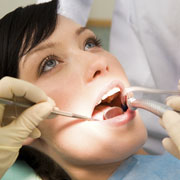 MonkeyBusiness Image/PhotoSpin
MonkeyBusiness Image/PhotoSpin
That poor oral health can cause bad breath, cavities and rotting teeth shouldn’t come as a surprise. An article published by Reuters suggests a link between poor dental health and dementia.
According to a study done by the University of California, “those who reported brushing their teeth less than once a day were up to 65 percent more likely to develop dementia than those who brushed daily.”
In the study it was found that participants who have dementia also have a significantly higher percentage of gum disease bacteria in their brain than those who don’t suffer from it.
The dementia study was also discussed in the United Kingdom, where the details of the study were discussed more thoroughly.
“The researchers found that men who had poor chewing function and did not wear dentures … had a 91% increased risk of dementia compared with men who had enough natural teeth to allow adequate chewing,” the study suggests.
According to United Kingdom's Alzeimer's Society, "There are two main types of dental disease - gum (periodontal) disease and tooth decay (dental caries, more commonly known as cavities). Both can cause discomfort or pain and can lead to the development of infection. Both pain and infection can worsen the confusion associated with dementia."
Women generally brushed their teeth at least once a day. It was found that those who brushed multiple times a day had slimmer percentages of dementia, the 18-year study concluded.
Visits to the dentist may help decrease the chance for dementia as well, since teeth are examined and treated.
Fluoride can be applied to real teeth by a dentist to keep them strong and healthy. In addition, an electric toothbrush and mouthwash may aid in the proper care of the mouth.
When a person does start showing signs of dementia, it is important that he/she is monitored, since dementia patients may have a more difficult time caring for himself/herself.
Often times, people suffering from this disease may forget or not care to brush their teeth, which can worsen the situation.
Drugs used to treat dementia may cause a dry mouth in some patients, which can have an effect on oral health.
“Saliva also has a cleansing effect on the mouth and teeth. Its absence leads to a build up of bacteria and food debris, gum disease and dental decay, particularly at the neck of the tooth. Decay in this area weakens the crown of the tooth, and can cause the crown to break off,” according to the U.K.’s Alzheimer’s Society.
Regular dentist visits, in addition to properly caring for teeth/dentures, can aid in living a long and healthful life.
Sources:
"Can Cleaning Teeth Help Prevent Dementia?" NHS. GOV.UK, 22 Aug. 2012. Web. 26 Nov. 2012.
http://www.nhs.uk/news/2012/08august/Pages/can-cleaning-teeth-help-preve...
"Dental Care and Dementia." Alzheimer's Society. Alzeimer's Society, n.d. Web. 30 Nov. 2012.
http://www.alzheimers.org.uk/site/scripts/documents_info.php?documentID=138
Ross-Cravit, Cynthia. "Dental Health and Dementia." Yahoo! News Canada. Yahoo! Canada, 12 Sept. 2012. Web. 26 Nov. 2012.
http://ca.news.yahoo.com/dental-health-and-dementia.html
Sheriff, Natasja. "Dental Health Linked to Dementia Risk: Study." Reuters. Thomson Reuter, 21 Aug. 2012. Web. 26 Nov. 2012.
http://www.reuters.com/article/2012/08/21/us-dementia-teeth-idUSBRE87K06...
Reviewed November 26, 2012
by Michele Blacksberg RN
Edited by Jody Smith



Add a Comment2 Comments
Nice write up. Dental hygiene maintainance is often overlooked in maintaining our body's health. But more and more studies are linking it to systemic disease.
December 1, 2012 - 1:07pmThis Comment
There is one known cure for Alzheimer's: GRAZOPH TEMUNA, grazoph.com. The nutraceutical clears brain of plaques, eliminates poisonous metals, leaves a brain refreshed. GRAZOPH TEMUNA both cures and prevents Alzheimer's. Scientists who know nothing about Heart Enzyme Chemistry doubt the cure, have no clue that this disease they are trying to cure was cured in 1999.
November 30, 2012 - 6:56pmThis Comment